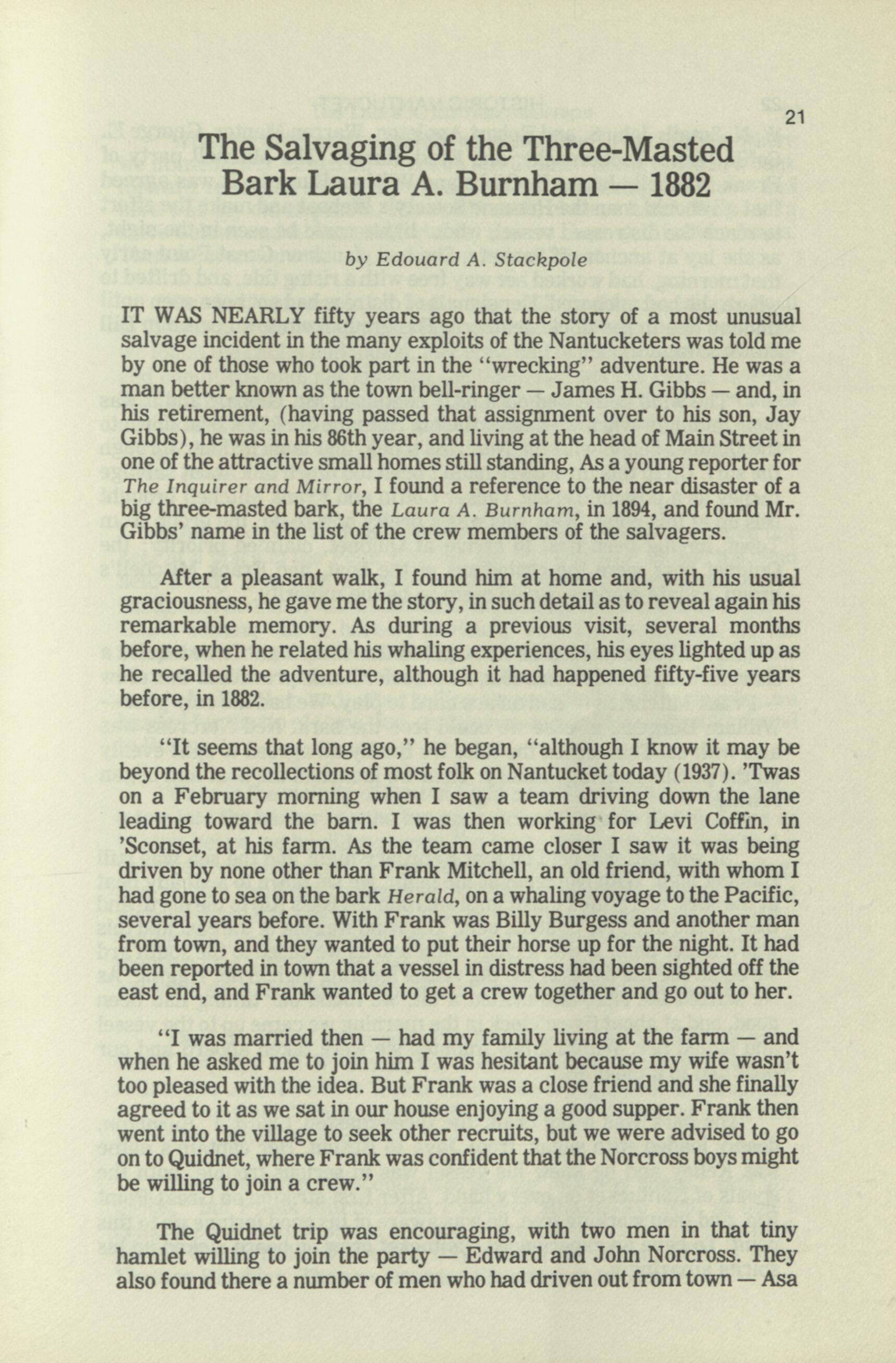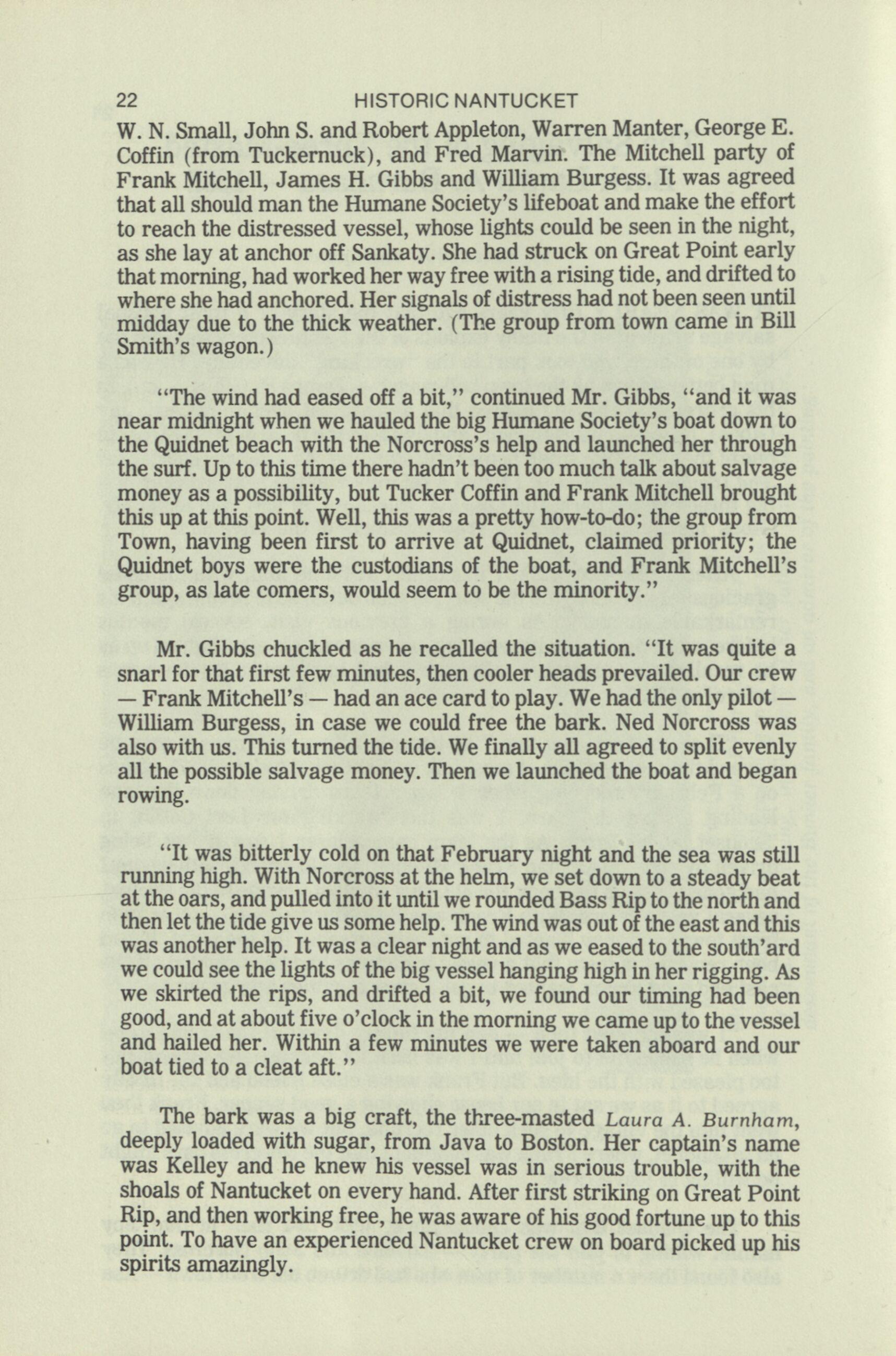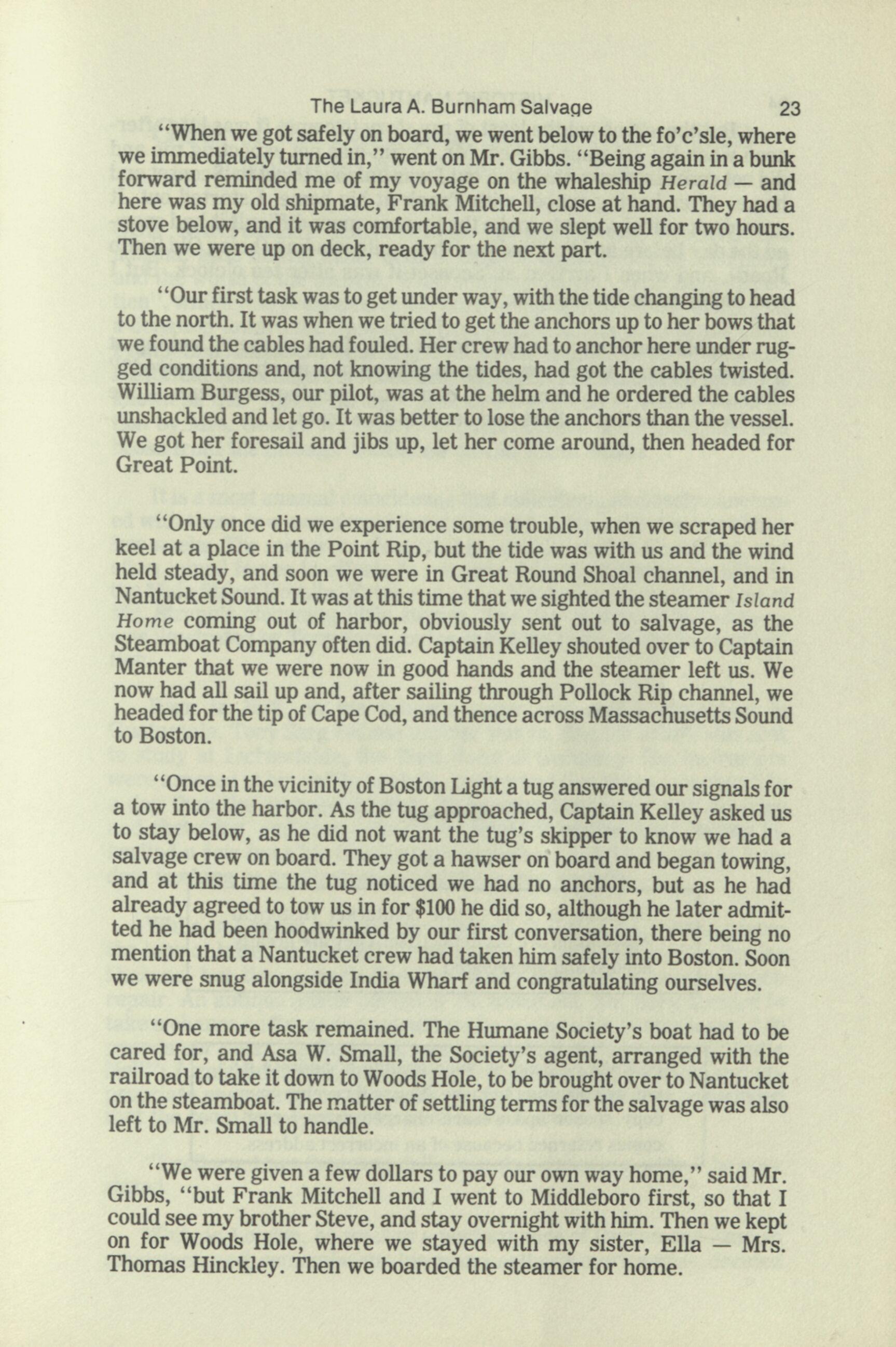
8 minute read
by Edouard A. Stackpole
The Salvaging of the Three-Masted Bark Laura A. Burnham — 1882
21
b y E d o u a r d A . S t a c k p o l e
IT WAS NEARLY fifty years ago that the story of a most unusual salvage incident in the many exploits of the Nantucketers was told me by one of those who took part in the "wrecking" adventure. He was a man better known as the town bell-ringer — James H. Gibbs — and, in his retirement, (having passed that assignment over to his son, Jay Gibbs), he was in his 86th year, and living at the head of Main Street in one of the attractive small homes still standing, As a young reporter for The Inquirer and Mirror, I found a reference to the near disaster of a big three-masted bark, the Laura A. Burnham, in 1894, and found Mr. Gibbs' name in the list of the crew members of the salvagers.
After a pleasant walk, I found him at home and, with his usual graciousness, he gave me the story, in such detail as to reveal again his remarkable memory. As during a previous visit, several months before, when he related his whaling experiences, his eyes lighted up as he recalled the adventure, although it had happened fifty-five years before, in 1882.
"It seems that long ago," he began, "although I know it may be beyond the recollections of most folk on Nantucket today (1937). 'Twas on a February morning when I saw a team driving down the lane leading toward the barn. I was then working for Levi Coffin, in 'Sconset, at his farm. As the team came closer I saw it was being driven by none other than Frank Mitchell, an old friend, with whom I had gone to sea on the bark Herald, on a whaling voyage to the Pacific, several years before. With Frank was Billy Burgess and another man from town, and they wanted to put their horse up for the night. It had been reported in town that a vessel in distress had been sighted off the east end, and Frank wanted to get a crew together and go out to her.
"I was married then — had my family living at the farm — and when he asked me to join him I was hesitant because my wife wasn't too pleased with the idea. But Frank was a close friend and she finally agreed to it as we sat in our house enjoying a good supper. Frank then went into the village to seek other recruits, but we were advised to go on to Quidnet, where Frank was confident that the Norcross boys might be willing to join a crew."
The Quidnet trip was encouraging, with two men in that tiny hamlet willing to join the party — Edward and John Norcross. They also found there a number of men who had driven out from town — Asa
22
HISTORIC NANTUCKET W. N. Small, John S. and Robert Appleton, Warren Manter, George E. Coffin (from Tuckernuck), and Fred Marvin. The Mitchell party of Frank Mitchell, James H. Gibbs and William Burgess. It was agreed that all should man the Humane Society's lifeboat and make the effort to reach the distressed vessel, whose lights could be seen in the night, as she lay at anchor off Sankaty. She had struck on Great Point early that morning, had worked her way free with a rising tide, and drifted to where she had anchored. Her signals of distress had not been seen until midday due to the thick weather. (The group from town came in Bill Smith's wagon.)
"The wind had eased off a bit," continued Mr. Gibbs, "and it was near midnight when we hauled the big Humane Society's boat down to the Quidnet beach with the Norcross's help and launched her through the surf. Up to this time there hadn't been too much talk about salvage money as a possibility, but Tucker Coffin and Frank Mitchell brought this up at this point. Well, this was a pretty how-to-do; the group from Town, having been first to arrive at Quidnet, claimed priority; the Quidnet boys were the custodians of the boat, and Frank Mitchell's group, as late comers, would seem to be the minority."
Mr. Gibbs chuckled as he recalled the situation. "It was quite a snarl for that first few minutes, then cooler heads prevailed. Our crew — Frank Mitchell's — had an ace card to play. We had the only pilot — William Burgess, in case we could free the bark. Ned Norcross was also with us. This turned the tide. We finally all agreed to split evenly all the possible salvage money. Then we launched the boat and began rowing.

"It was bitterly cold on that February night and the sea was still running high. With Norcross at the helm, we set down to a steady beat at the oars, and pulled into it until we rounded Bass Rip to the north and then let the tide give us some help. The wind was out of the east and this was another help. It was a clear night and as we eased to the south'ard we could see the lights of the big vessel hanging high in her rigging. As we skirted the rips, and drifted a bit, we found our timing had been good, and at about five o'clock in the morning we came up to the vessel and hailed her. Within a few minutes we were taken aboard and our boat tied to a cleat aft."
The bark was a big craft, the three-masted Laura A. Bumham, deeply loaded with sugar, from Java to Boston. Her captain's name was Kelley and he knew his vessel was in serious trouble, with the shoals of Nantucket on every hand. After first striking on Great Point Rip, and then working free, he was aware of his good fortune up to this point. To have an experienced Nantucket crew on board picked up his spirits amazingly.
The Laura A. Burnham Salvage
23 "When we got safely on board, we went below to the fo'c'sle, where we immediately turned in," went on Mr. Gibbs. "Being again in a bunk forward reminded me of my voyage on the whaleship Herald — and here was my old shipmate, Frank Mitchell, close at hand. They had a stove below, and it was comfortable, and we slept well for two hours. Then we were up on deck, ready for the next part.
"Our first task was to get under way, with the tide changing to head to the north. It was when we tried to get the anchors up to her bows that we found the cables had fouled. Her crew had to anchor here under rugged conditions and, not knowing the tides, had got the cables twisted. William Burgess, our pilot, was at the helm and he ordered the cables unshackled and let go. It was better to lose the anchors than the vessel. We got her foresail and jibs up, let her come around, then headed for Great Point.
"Only once did we experience some trouble, when we scraped her keel at a place in the Point Rip, but the tide was with us and the wind held steady, and soon we were in Great Round Shoal channel, and in Na n t u c k et S ou n d . I t wa s a t t his t i m e t hat we s i g h t e d t he s t e a m er i s l a n d Home coming out of harbor, obviously sent out to salvage, as the Steamboat Company often did. Captain Kelley shouted over to Captain Manter that we were now in good hands and the steamer left us. We now had all sail up and, after sailing through Pollock Rip channel, we headed for the tip of Cape Cod, and thence across Massachusetts Sound to Boston.

"Once in the vicinity of Boston Light a tug answered our signals for a tow into the harbor. As the tug approached, Captain Kelley asked us to stay below, as he did not want the tug's skipper to know we had a salvage crew on board. They got a hawser on board and began towing, and at this time the tug noticed we had no anchors, but as he had already agreed to tow us in for $100 he did so, although he later admitted he had been hoodwinked by our first conversation, there being no mention that a Nantucket crew had taken him safely into Boston. Soon we were snug alongside India Wharf and congratulating ourselves.
"One more task remained. The Humane Society's boat had to be cared for, and Asa W. Small, the Society's agent, arranged with the railroad to take it down to Woods Hole, to be brought over to Nantucket on the steamboat. The matter of settling terms for the salvage was also left to Mr. Small to handle.
"We were given a few dollars to pay our own way home," said Mr. Gibbs, "but Frank Mitchell and I went to Middleboro first, so that I could see my brother Steve, and stay overnight with him. Then we kept on for Woods Hole, where we stayed with my sister, Ella — Mrs. Thomas Hinckley. Then we boarded the steamer for home.









